Week ending 15 August 2020
REGIONAL OVERVIEW
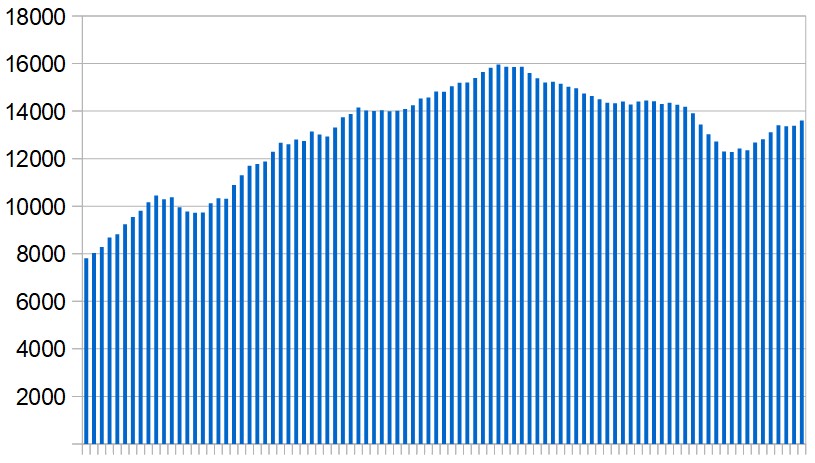 |
The Middle East and North Africa has seen an overall rise in Covid-19 infections during the past week, with an average of almost 13,600 new cases reported each day.
Among the 20 countries monitored, only three – Algeria, Iran and Oman – have reported a decrease compared with the week before.
The situation in Iraq is especially alarming, with the daily tally of new cases rising above 4,000 for the first time. That is just the official figure – the real number is believed to by much higher.
Lebanon, Morocco and Syria also reported a worsening situation and Jordan, despite earlier success in controlling the virus, now has a spate of locally-transmitted infections.
Detailed statistics for the region, based on official figures, can be found in this spreadsheet.
Previous situation reports:
August 8; August 1; July 25; July 18; July 11; July 4; June 27; June 20.
ALGERIA
New infections in Algeria increased substantially in June and July, though the numbers have gone down slightly since then. Official figures show new cases averaged 501 a day during past week compared with 621 a day at the end of July.
Restrictions imposed in 29 of Algeria's 58 wilayas (administrative districts) were eased this week. The ban on travel to and from these areas has been lifted and the night curfew has been shortened by two hours (11pm to 6am instead of 8pm to 5am).
Large mosques (1,000-plus capacity) are being alllowed to open throughout the country from today but only for men, and congregational prayers on Fridays are still banned.
About 4,025 medical staff have been infected with Covid-19 in Algeria and 69 of them have died, according to the government's scientific committee. These figures are a lot higher than those given by the health minister last month.
For more information see: Covid-19 in Algeria
Confirmed cases: 37,664
New cases in past week: 3,509
Active cases: 9,206
Deaths: 1,351
Tests carried out: (unknown)
BAHRAIN
Bahrain has more than 26,000 known cases per million inhabitants. This makes it the world's third most infected country after Qatar and French Guiana. However, Bahrain is also one of the world leaders in Covid-19 testing. So far, more than half of its 1.7 million population have been tested.
The daily total of new cases fluctuates but Bahrain's epidemic appears to be subsiding gradually. The number of people reported to be currently infected is around 3,400, compared with 5,700 at the peak in mid-June.
Cafes and restaurants remain closed but the authorities have announced plans for a phased reopening in September. The education ministry has also issued a circular to private schools setting out procedures for the new academic year.
Bahrain’s budget deficit has almost doubled in the first half of the year due to the combined effects of the pandemic and low oil prices. Forbes magazine reports: "Government revenues in the first half of 2020 fell to BD910 million ($2.4 billion), down 29% compared to the same period last year. Oil revenues were down 35%, as the price of crude plummeted amid lower global demand and a price war led by Saudi Arabia and Russia."
For more information see: Covid-19 in Bahrain
Confirmed cases: 46,052
New cases in past week: 2,745
Active cases: 3,415
Deaths: 168
Tests carried out: 954,000
EGYPT
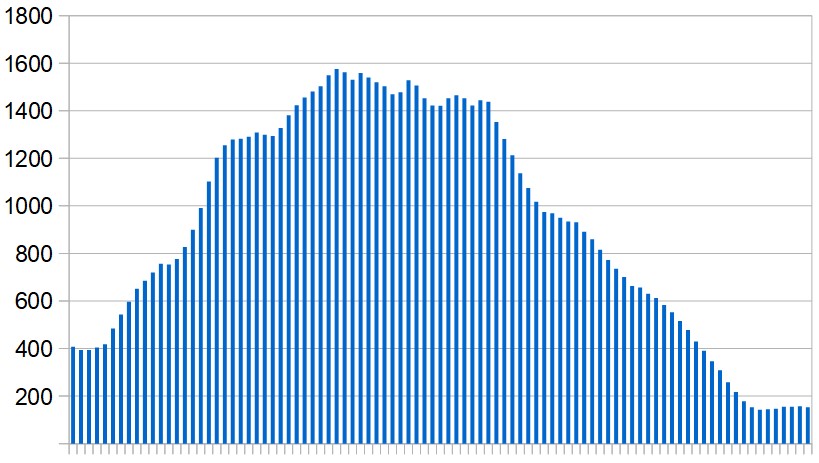 |
New cases peaked in June and have been falling sharply during the past few weeks, according to official figures. This week's average was 153 cases a day compared with almost 1,600 at the peak.
Although Egypt's official figures have often been viewed with suspicion there is other evidence that its outbreak is subsiding. For example, the health ministry has been closing down some of its temporary isolation facilities.
Egypt has been anxious to revive its economically important tourism sector and in July it began reopening its seaside resorts for foreign visitors. These resorts – in South Sinai, the Red Sea and Marsa Matrouh on the Mediterranean coast – have been isolated from the rest of the country to reduce the risk of infections spreading. Foreigners flying directly to the resorts don't need to be tested for Covid-19 but they will need a test if they wish to leave the resort and visit other parts of the country. Foreigners arriving in other parts of the country must have tested negative during the 72 hours before travelling and will not be allowed to visit the resorts.
For more information see: Covid-19 in Egypt
Confirmed cases: 96,220
New cases in past week: 1,073
Active cases: 33,238
Deaths: 5,124
Tests carried out: 135,000
IRAN
Iran was the first country in the region to be seriously affected by the virus and its epidemic shows no sign of abating. Government figures show an initial wave of infections which peaked at the end of March. It subsided during April, briefly dipping below 1,000 new cases per day but then rose to a new peak in the first week of June.
New cases this week averaged 2,323 a day – virtually unchanged from the previous week.
Iran continues to report more coronavirus-related deaths than any other country in the region. A further 1,199 deaths have been recorded during the past week.
Confirmed cases: 338,825
New cases in past week: 16,258
Active cases: 25,683
Deaths: 19,331
Tests carried out: 2.8 million
IRAQ
Iraq is currently recording more new infections than any other country in the region. New cases this week averaged more than 3,400 a day and Friday's total of 4,013 cases was the highest since the outbreak began. Worse still, Iraq's official figures are widely believed to understate the scale of the epidemic. Many cases go unreported because of social stigma. Compliance with preventive measures appears to be low and health services are inadequate.
For more information see: Covid-19 in Iraq
Confirmed cases: 168,290
New cases in past week: 24,226
Active cases: 42,452
Deaths: 5,709
Tests carried out: 1.2 million
ISRAEL
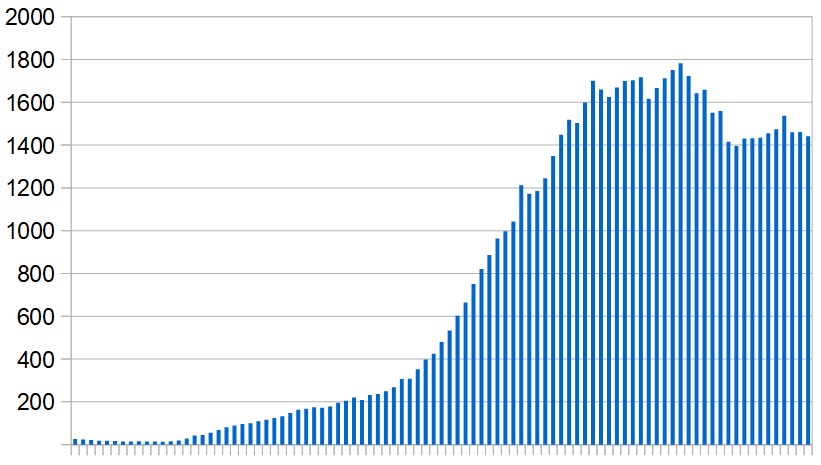 |
After coming close to bringing the epidemic under control, Israel has been hit by a second wave much larger than the first. The first wave peaked at around 600 new cases a day in early April. Efforts to control it were intially successful and by the second half of May new cases had dropped to about 15 a day.
However, the virus surged back when lockdown restrictions were lifted and by the end of July new cases were averaging almost 1,800 a day. The second wave now appears to have peaked but the number of new cases remains high, averaging 1,441 a day this week.
For more information see: Covid-19 in Israel
Confirmed cases: 91,080
New cases in past week: 10,089
Active cases: 23,450
Deaths: 665
Tests carried out: 2.1 million
JORDAN
Until this week Jordan appeared to be the most successful Arab country in controlling the virus. Although it continued to intercept new cases among people arriving from abroad, transmission within the country had virtually ceased. This week, however, there has been a spate of locally-occurring cases.
Of the 94 new infections reported over the last seven days, 65 were local. Most of those are said to be linked to an outbreak at the Jaber-Nasib crossing point on the border with Syria where at least nine employees have been diagnosed with the virus (see news report). The crossing point has been closed since Thursday and all its workers are being quarantined.
Buildings in several cities have been sealed off but preventing further infections is likely to be a huge task. Health minister Saad Jaber said on Thursday that 49 of the people who tested positive during the past week had a combined total of more than 3,200 contacts.
The night curfew is being extended to six hours from today and the government has hinted that further preventive measures may be on the way. There is resistance from the public, however. Earlier this week the health minister said 73 people had been arrested for trying to escape from isolation areas and others had been caught trying to "manipulate" the results of PCR tests by rubbing alcohol up their noses.
For more information see: Covid-19 in Jordan
Confirmed cases: 1,329
New cases in past week: 94
Active cases: 89
Deaths: 11
Tests carried out: 679,000
KUWAIT
New infections peaked in late May at just over 1,000 cases a day. The numbers have dropped back substantially since then and this week's average was 637 a day.
The government has announced that further restrictions will be lifted on Tuesday. Gyms, sport clubs, beauty salons and tailors will be allowed to reopen. Football matches will resume but without spectators. The partial curfew will remain.
As a result of the economic downturn caused by the pandemic and low oil prices Kuwait is planning to expel 360,000 foreigners:
● 120,000 illegal workers
● 150,000 expats aged over 60 (employees, dependents or those suffering from chronic diseases)
● 90,000 "marginal and poorly-educated labourers"
As yet, there is no timetable for these expulsions.
For more information see: Covid-19 in Kuwait
Confirmed cases: 75,185
New cases in past week: 4,458
Active cases: 7,951
Deaths: 494
Tests carried out: 552,000
LEBANON
Political and economic turmoil, plus the devastating explosion in Beirut last week, have diverted attention from the coronavirus. Although Lebanon's outbreak is still relatively small, infections have surged during the past month. New cases this week averaged 299 a day – almost double the level at the end of July.
For more information see: Covid-19 in Lebanon
Confirmed cases: 8,045
New cases in past week: 2,0
Active cases: 5,400
Deaths: 94
Tests carried out: 401,000
LIBYA
Libya is in its ninth year of internal conflict. The UN-backed Government of National Unity in Tripoli is challenged by Field Marshall Haftar's forces based in the east of the country. There are also numerous militias. This leaves the country ill-equipped to cope with a major epidemic.
Growing levels of insecurity, political fragmentation and weak governance have led to a deterioration of basic services, particularly in the health system. At least 27 health facilities have been damaged or closed by fighting and some have been attacked directly. There are 870,000 people – refugees, asylum seekers and displaced persons – who the UN regards as especially vulnerable.
The World Health Organisation (WHO) describes the coronavirus situation in Libya as "clusters of cases" – in other words, a series of local outbreaks rather than a generalised epidemic. Sebha, Tripoli, Zliten, Misrata, Ashshatti, Ubari, Traghen, Janzour and Khoms are said to be particular hotspots.
Testing is very limited and the number of confirmed infections is still relatively small but growing fast. Half of the known cases were recorded this month.
Investigations by the National Centre for Disease Control (NCDC) have concluded that most infections are the result of people not practising social distancing. The Libya Herald reports that most people do not wear masks in public. It adds: "Many still spend the weekend with their parents/relatives, attend funerals, baby-parties, and weddings. And although function halls have been forced to shut down, many are holding events for hundreds in open locations such as farms."
The authorities in Tripoli have responded by announcing series of penalty charges, including fines of 250 dinars ($180) for not wearing a face mask on public transport and 500 dinars (plus temporary closure) for businesses that fail to enforce mask-wearing.
For more information see: Covid-19 in Libya
Confirmed cases: 7,327
New cases in past week: 1,458
Active cases: 6,340
Deaths: 139
Tests carried out: 73,000
MOROCCO
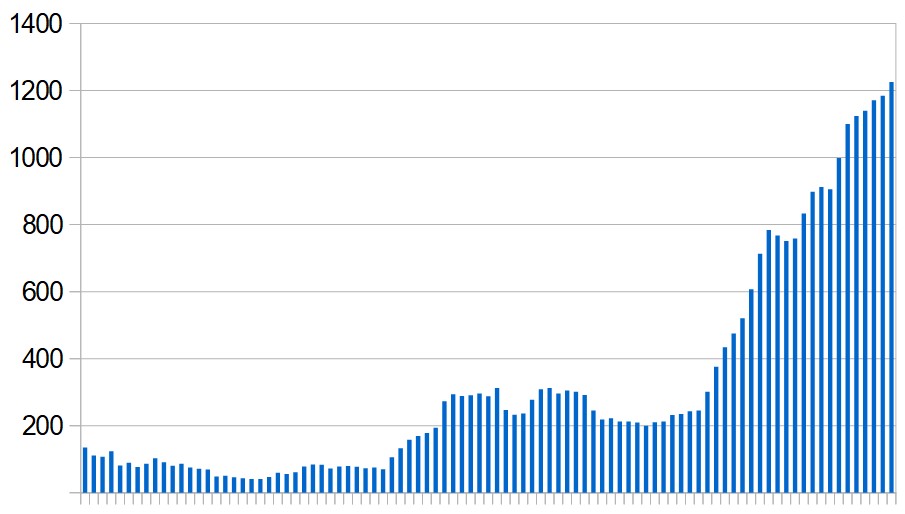 |
The situation in Morocco continues to worsen, with record numbers of new infections.
Initially, Morocco had some success in containing the virus and by early June, as a result of its strict lockdown, new cases had fallen to around 40 a day. However, there have been steep increases since then and new cases this week have averaged 1,226 a day.
The regions around Casablanca and Tangier account for almost 50% of all recorded cases, according to official figures:
● Casablanca-Settat 27%
● Tangier-Tetouan-Hoceima 21%
● Fez-Meknes region 16%
● Marrakech-Safi 16%
● Rabat-Sale-Kenitra 9%
Wearing of face masks is compulsory in public but compliance appears to be declining, partly as a result of the hot weather. The current penalties are a fine ranging from $29 to $129 and/or one to three months in jail.
This week a new 48-bed medical unit specifically for treating Covid-19 cases was opened at the Mohammed VI Hospital in Tangier.
According to the nurses' union 118 health workers have been infected since the outbreak began.
For more information see: Covid-19 in Morocco
Confirmed cases: 39,241
New cases in past week: 8,579
Active cases: 10,986
Deaths: 611
Tests carried out: 1.6 million
OMAN
Infections peaked in mid-July with just under 1,600 cases a day but are now on a downward path. New cases averaged 239 a day this week – a substantial drop to levels not seen since mid-May.
Travel restrictions inside the country were eased last week and the night-time curfew (9pm to 5am) is due to end today.
More than 600 medical staff in Oman have been infected with Covid-19 since the outbreak began, according to the government.
For more information see: Covid-19 in Oman
Confirmed cases: 82,743
New cases in past week: 1,676
Active cases: 4,759
Deaths: 557
Tests carried out: 309,000
PALESTINE
Palestine, like Israel, is in the midst of a wave of new infections. Hebron is the most seriously affected area, with 9,915 confirmed cases – almost half the total.
New cases this week averaged 444 a day – about 40 below the peak recorded towards the end of July.
Many of the recent infections are attributed to people ignoring the rules for social distancing, which the authorities have difficulty enforcing. The health ministry says more than 30% of cases are the result of Palestinians travelling to and from work in Israel which is in the second wave of its epidemic.
Fears of a major outbreak in Gaza have not materialised. Most of the known cases there appear to have been due to contacts with Egypt.
For more information see: Covid-19 in Palestine
Confirmed cases: 21,056 (West Bank 14,118, Gaza 82, East Jerusalem 6,856)
New cases in past week: 3,108
Active cases: 6,346
Deaths: 116
Tests carried out: 214,000
QATAR
In population terms Qatar has more known cases than any other country – 39,000 per million inhabitants. Migrant workers have been disproportionately affected. Qatar's epidemic reached a peak in the first week of June but infections have fallen since then. New cases this week averaged 307 a day – a small increase on the previous week but still well below the peak of more than 1,800 a day.
Qatar Airways, whose flight attendants wear full PPE gear, is reported to have warned crews about "irresponsible" behaviour during rest periods. Crews are required to live in accommodation provided by the airline and their movements are tracked by security guards, key cards and surveillance cameras. However, a memo circulated by the company says there have been "several instances" of crew members failing to comply with Covid-19 regulations. They have now been placed under a 9pm to 7am curfew, with instructions not to take part in "gatherings or social events of any kind either within, or outside of, company accommodation".
For more information see: Covid-19 in Qatar
Confirmed cases: 114,532
New cases in past week: 2,149
Active cases: 3,084
Deaths: 190
Tests carried out: 542,000
SAUDI ARABIA
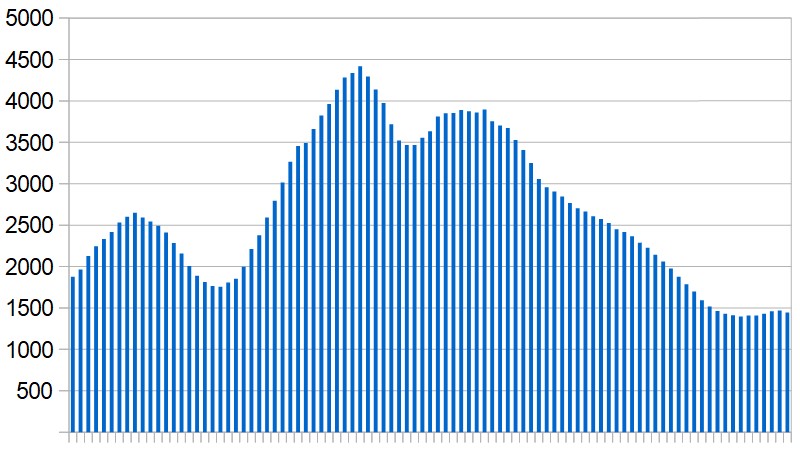 |
Saudi Arabia has the largest number of recorded cases among the Arab countries. New infections reached an initial peak in the fourth week of May, then dropped back slightly before rising to a higher peak in the third week of June. Since then, though, there has been a substantial improvement.
Numbers of new cases are still large. This week they averaged 1,444 a day – a small rise since the previous week but still about 3,000 a day below the June peak. The kingdom currently has fewer than 30,000 active cases compared with more than 63,000 at the peak.
Migrant workers have been disproportionately affected but the authorities have also complained about non-compliance with precautionary measures by Saudi citizens.
For more information see: Covid-19 in Saudi Arabia
Confirmed cases: 295,902
New cases in past week: 10,109
Active cases: 29,605
Deaths: 3,338
Tests carried out: 4.1 million
SUDAN
The coronavirus struck Sudan in the midst of a political transition following a popular uprising against the regime of President Bashir and the country is ill-equipped to cope with a major epidemic. Testing is very limited and official figures don't reflect the full scale of the outbreak.
For more information see: Covid-19 in Sudan
Confirmed cases: 12,162
New cases in past week: 268
Active cases: 5,044
Deaths: 793
Tests carried out: (unknown)
SYRIA
According to official figures Syria's outbreak is still small, with just over 1,500 cases reported in areas controlled by the Assad regime. Even so, that is twice as many as at the end of July.
Official announcements rarely give any details and this lack of transparency fuels suspicions that many cases are being concealed. There is also some evidence that people with Covid-19 symptoms are reluctant to contact the authorities.
Anecdotal evidence suggests community transmission of the virus is now widespread. Syria also appears to be the source of an outbreak in Jordan among workers at the border checkpoint.
Fears have been raised about north-western and north-eastern parts of the country which are outside the regime's control. Millions of displaced people are living in those areas and health services are often rudimentary. So far, 144 cases have been confirmed in the north-east and 47 in the north-west according to Syria in Context, a subscription website.
For more information see: Covid-19 in Syria
The following figures relate to regime-controlled areas only:
Confirmed cases: 1,515
New cases in past week: 455
Active cases: 1,054
Deaths: 58
Tests carried out: (unknown)
TUNISIA
Tunisia's outbreak remains small, with fewer than 2,000 infections recorded so far. New cases are growing, though, This week they averaged 35 a day – twice as many as in the previous week.
Until recently most infections were among people arriving from abroad and there was little transmission of the virus inside the country. That now seems to be changing. Of the 56 cases recorded on Friday, only seven were imported – all the rest occurred locally. Gabes province is reported to be a particular hotspot.
For more information see: Covid-19 in Tunisia
Confirmed cases: 1,903
New cases in past week: 247
Active cases: 530
Deaths: 53
Tests carried out: 108,000
UNITED ARAB EMIRATES
The UAE's epidemic peaked in the last week of May when new infections were running at more than 900 a day. New cases this week averaged 251 a day.
The UAE has carried out more tests per head of population than any other Arab country and ranks sixth worldwide in terms of levels of testing.
A vaccine developed by the Chinese company Sinopharm is undergoing Phase 3 trials in the UAE. So far 15,000 volunteers have been vaccinated.
For more information see: Covid-19 in the UAE
Confirmed cases: 63,819
New cases in past week: 1,758
Active cases: 5,987
Deaths: 359
Tests carried out: 5.9 million
YEMEN
Because of the ongoing war, Yemen already faced a humanitarian crisis before the coronavirus arrived. Millions are malnourished and vulnerable to disease, and health services are inadequate. Official figures grossly understate the severity of the epidemic. Cholera is also prevalent.
In a report published on Friday, the International Organisation for Migration said:
"Access to health services continues to be significantly limited during this critical time: health facilities (only 50% of them are fully functional) are facing severe equipment, medicine and fuel shortages.
"Many health facilities are either full, closing or turning away suspected COVID-19 cases, while reports indicate that people continue to delay seeking care for fear of stigma, safety concerns and limited access to testing."
For more information see: Covid-19 in Yemen
Confirmed cases: 1,862
New cases in past week: 62
Active cases: 321
Deaths: 529
Tests carried out: (unknown)

 RSS Feed
RSS Feed
